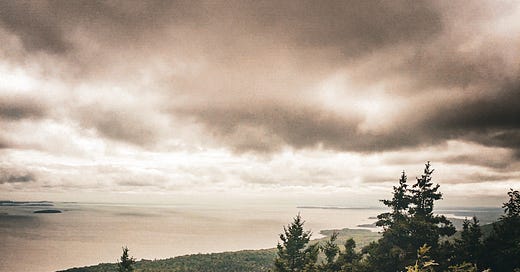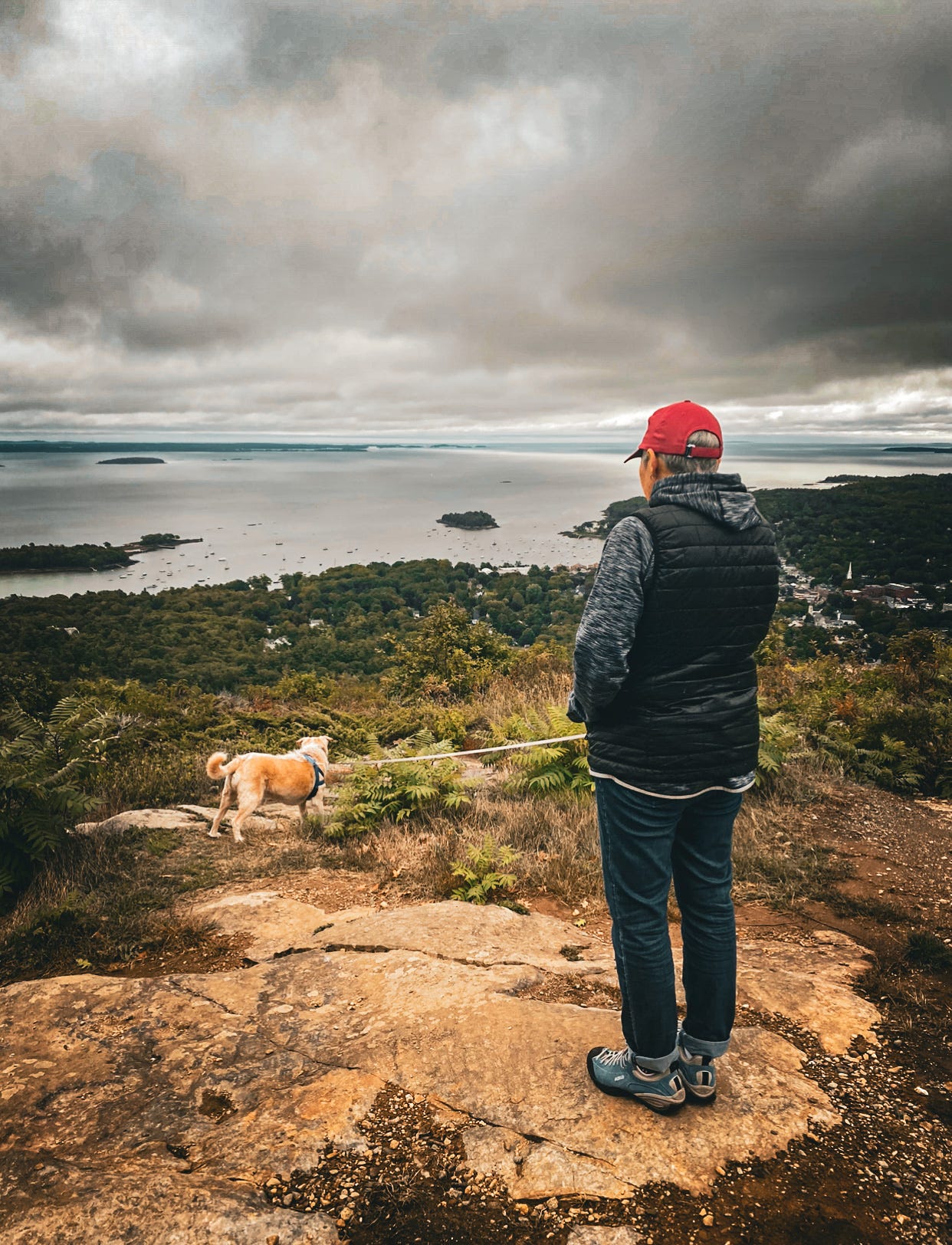Two weeks ago, I was standing at the top of Mount Battie in Camden, Maine looking out over the broad expanse of Penobscot Bay, and in the distance, Isle au Haut, North Haven, Isleboro, and, further to the north, Cadillac Mountain in Acadia. We had our sweet old dog Pete with us, who is no longer fit for the climb (nor am I at the moment), so we drove up on the auto road, parked, and walked to the rocky edge of the cliff and gazed east. And I remembered something my father used to tell me about the most extraordinary thing he experienced as a pilot in the Second World War flying over the Pacific, beyond coming home alive: you can see the curve of the earth.
I will never be one of those people who feels the need to be a space tourist nor am I by nature a mountain-conquerer. I love to hike and walk and I love vistas, and Everest Base Camp was long on my bucket list (until it became something of an amusement park; leave it to humans), but I have absolutely no compulsion to own the mountain, as some of my climber friends like to call it. Conquering, owning, vanquishing: not for me. In The Snow Leopard, Peter Matthiessen writes
The secret of the mountain is that the mountains simply exist, as I do myself: the mountains exist simply, which I do not. The mountains have no "meaning," they are meaning; the mountains are.
And so too is the curve of the earth: it simply is. This is its secret: it simply exists. I simply exist. The curve of the earth exists simply; I do not, try as I might. As a human, I complicate matters, and as a human, so do you.
I am writing this during the period just before Yom Kippur, the holiest day in the Jewish calendar. I was raised by two parents who were Jewish — my father was the son of a fire-and-brimstone Orthodox cantor; my mother grew up in a house that did not mix meat and dairy — but who also generally did not actually practice their faith. In the 1970s, when all of my Jewish friends were starting to be Bar and Bat Mitzvahed, I wanted to be also. After much begging, I was sent to Hebrew school at eleven years old, and when the teacher asked the class what day the sabbath was, I raised my hand and said Sunday. The teacher called my father and said Mr Altman your daughter has an assimilation problem—please come get her. It’s not that I was being cheeky or rude; I honestly didn’t know that the Jewish sabbath is Saturday, which, I suppose, is why I was in Hebrew School to begin with. I learned, years later, that I was not sent for formal training and religious education for one reason: my father had had a withering and bitter relationship with prayer —- if he misstepped, as little boys will, or didn’t pray hard enough, he was often beaten. My grandfather was a good and kind man, at least to me, but he was also very old school, and it was utterly devastating for my father. So prayer and any adherence to his faith became Pavlovian for him: even as he was drawn to it like a moth to flame, the sound and practice of ancient prayer were traumatic, and that was passed along to me. My grandfather carried his own traumas at the cellular level, from pogroms to landing in America from Ukraine alone at eleven, to finding out why his mother stopped answering his letters in 1942. This is proof that, as Gabor Mate says, trauma begets trauma begets trauma, unless it is dealt with once and for all, and sometimes not even then.
As Gabor Mate says, trauma begets trauma begets trauma, unless it is dealt with once and for all, and sometimes not even then.
Over the years, I have been asked to explain my particular brand of faith; it is difficult for me to do. I think of myself as a profoundly spiritual person, and at one point considered studying divinity at the graduate level because I wanted to find a way to marry the subject to food and sustenance, and to the environment; I believe they are inextricably connected. And at some point I may still do that. But in terms of pinpointing what I believe and why, my faith is a moving target. I believe in a power greater than myself, for certain. I worry about humans who shape and mold religious dogma to suit their own beliefs, and sometimes, their lobbyists. And I tend to think that if we cannot step outside ourselves—outside the grandiose confines of our own egos—this is where and when we get into trouble. I believe in the sanctity of the natural world and of art and music; I believe in the thing (the Great Hand?) that turns us this way instead of that way in order to make the right decisions; I believe in grace, which, in itself, is difficult to describe. I believe in the thing that makes us realize how very small we are, how limited our time on earth really is, and how much beauty we are surrounded by—-not for the taking, but for the absorbing, the respecting, the metabolizing.
So a few weeks ago Susan and I stood at the edge of the Mt. Battie cliff in Camden and we saw the curve of the earth. I felt so small and so sated—so sustained—-all at once. Like the mountains in The Snow Leopard, it has no meaning; it is meaning.







Nice summation: "Like the mountains in The Snow Leopard, it has no meaning; it is meaning."
Archibald MacLeish climbed to the same summit in Ars Poetica: “A poem should not mean/But be.”
Beautiful, down-to-earth spirituality. We humans do “complicate things,” and I thank the author (and their trusty dog) for this humble and awe-inspiring glimpse of “the curve of the earth.”